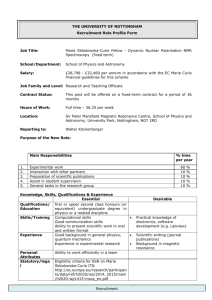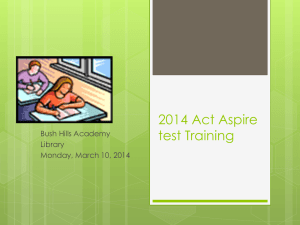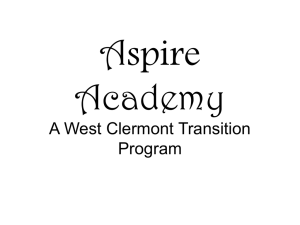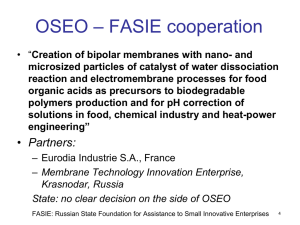Nottingham University - Jobs
advertisement
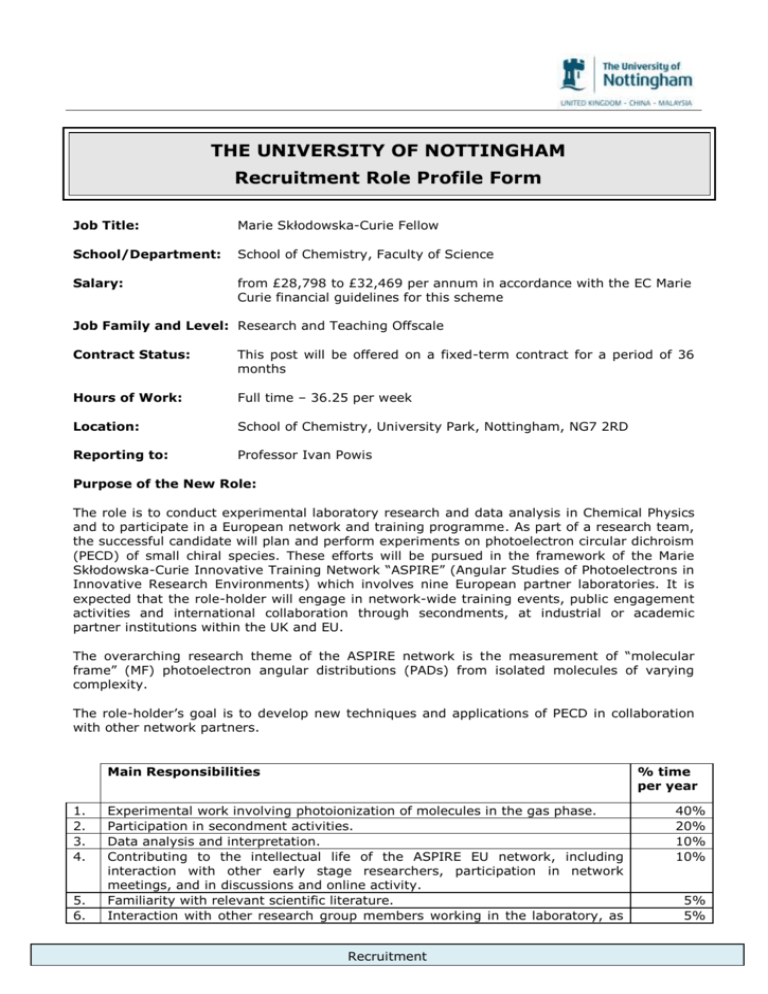
THE UNIVERSITY OF NOTTINGHAM Recruitment Role Profile Form Job Title: Marie Skłodowska-Curie Fellow School/Department: School of Chemistry, Faculty of Science Salary: from £28,798 to £32,469 per annum in accordance with the EC Marie Curie financial guidelines for this scheme Job Family and Level: Research and Teaching Offscale Contract Status: This post will be offered on a fixed-term contract for a period of 36 months Hours of Work: Full time – 36.25 per week Location: School of Chemistry, University Park, Nottingham, NG7 2RD Reporting to: Professor Ivan Powis Purpose of the New Role: The role is to conduct experimental laboratory research and data analysis in Chemical Physics and to participate in a European network and training programme. As part of a research team, the successful candidate will plan and perform experiments on photoelectron circular dichroism (PECD) of small chiral species. These efforts will be pursued in the framework of the Marie Skłodowska-Curie Innovative Training Network “ASPIRE” (Angular Studies of Photoelectrons in Innovative Research Environments) which involves nine European partner laboratories. It is expected that the role-holder will engage in network-wide training events, public engagement activities and international collaboration through secondments, at industrial or academic partner institutions within the UK and EU. The overarching research theme of the ASPIRE network is the measurement of “molecular frame” (MF) photoelectron angular distributions (PADs) from isolated molecules of varying complexity. The role-holder’s goal is to develop new techniques and applications of PECD in collaboration with other network partners. Main Responsibilities 1. 2. 3. 4. 5. 6. % time per year Experimental work involving photoionization of molecules in the gas phase. Participation in secondment activities. Data analysis and interpretation. Contributing to the intellectual life of the ASPIRE EU network, including interaction with other early stage researchers, participation in network meetings, and in discussions and online activity. Familiarity with relevant scientific literature. Interaction with other research group members working in the laboratory, as Recruitment 40% 20% 10% 10% 5% 5% 7. 8. appropriate. Accepting delegated responsibility for safe laboratory practice. Involvement in outreach activities associated with ASPIRE. 5% 5% Knowledge, Skills, Qualifications & Experience Qualifications/ Education Skills/Training Experience Essential Excellent Masters Degree in a relevant discipline (e.g. Physics, Chemistry, Chemical Physics), enabling the candidate to register for a doctoral degree Good communication skills, both orally and in written English, laying groundwork for the preparation of scientific articles and presentation of research at network meetings and conferences Basic laboratory skills (safe operating practice) and use of instrumentation such as oscilloscopes Research experience in a relevant area of physics or chemical physics at Masters level. Personal Attributes Statutory/Legal Desirable Familiarity technology Familiarity technology with vacuum with laser Scientific writing Oral presentations Data analysis Computer programming Well organised and self-motivated Ability to work independently and as part of a team Eligibility criteria for Early Stage Researchers in Marie SkłodowskaCurie ITNs http://ec.europa.eu/research/parti cipants/data/ref/h2020/wp/2014_2 015/main/h2020-wp1415msca_en.pdf Decision Making i) taken independently by the role holder Training. Day-to-day operation of the experimental setup following appropriate training. Data analysis following appropriate training. ii) taken in collaboration with others Changes to experimental set up and procedures. Interpretation of results. Preparation for network events. Review of progress. Secondment activities. Preparation for publication. iii) referred to the appropriate line manager (please name) by the role holder Decisions regarding strategic decisions of scientific direction and priorities, as well as financial, and personnel matters will be referred to Professor Ivan Powis. Additional Information Informal enquiries may be addressed to Dr Rhianna Briars (rhianna.briars@nottingham.ac.uk) or Professor Ivan Powis (ivan.powis@nottingham.ac.uk). Please note that applications sent directly to these email addresses will not be accepted. Page 2 of 6 Applicants will be considered on an equal basis, subject to the relevant permission to work in the UK as defined by the requirements set out by the UK Border and Immigration Agency. Please visit http://www.ukba.homeoffice.gov.uk/ for more information. The successful applicant will be required to satisfy the eligibility criteria for Marie Curie Early Stage Researchers, i.e: Must be within the first four years (full-time equivalent) of their research career Must not have resided or carried out their main activity (work, studies, etc.) within the UK for more than 12 months in the three years immediately prior to their recruitment. Further information is available at http://ec.europa.eu/research/mariecurieactions/ Page 3 of 6 THE UNIVERSITY OF NOTTINGHAM Recruitment Role Profile Form Job Title: Marie Skłodowska-Curie Fellow School/Department: School of Chemistry, Faculty of Science Salary: from £28,798 to £32,469 per annum in accordance with the EC Marie Skłodowska-Curie financial guidelines for this scheme Job Family and Level: Research and Teaching Offscale Contract Status: This post will be offered on a fixed-term contract for a period of 36 months Hours of Work: Full time – 36.25 per week Location: School of Chemistry, University Park, Nottingham, NG7 2RD Reporting to: Professor Katharine Reid Purpose of the New Role: The role is to conduct experimental laboratory research and data analysis in Chemical Physics and to participate in a European network and training programme. As part of a research team, the successful candidate will plan and perform photoelectron imaging experiments on moderately sized polyatomic molecules. These efforts will be pursued in the framework of the Marie Skłodowska-Curie Innovative Training Network “ASPIRE” (Angular Studies of Photoelectrons in Innovative Research Environments) which involves nine European partner laboratories. It is expected that the role-holder will engage in network-wide training events, public engagement activities and international collaboration through secondments, at industrial or academic partner institutions within the UK and EU. The overarching research theme of the ASPIRE network is the measurement of “molecular frame” (MF) photoelectron angular distributions (PADs) from isolated molecules of varying complexity. The role-holder’s goal is to implement laser alignment techniques and to measure and interpret photoelectron images resulting from the photoionization of aligned molecules. Main Responsibilities 1. 2. 3. 4. 5. 6. 7. 9. % time per year Experimental work involving the measurement of photoelectron images following the interaction of molecules with pulses of laser light. Participation in secondment activities. Data analysis and interpretation. Contributing to the intellectual life of the ASPIRE EU network, including interaction with other early stage researchers, participation in network meetings, and in discussions and online activity. Familiarity with relevant scientific literature. Interaction with other research group members working in the laboratory, as appropriate. Accepting delegated responsibility for safe laboratory practice. Involvement in outreach activities associated with ASPIRE. Page 4 of 6 40% 20% 10% 10% 5% 5% 5% 5% Knowledge, Skills, Qualifications & Experience Qualifications/ Education Skills/Training Experience Essential Excellent Masters Degree in a relevant discipline (e.g. Physics, Chemistry, Chemical Physics), enabling the candidate to register for a doctoral degree Good communication skills, both orally and in written English, laying groundwork for the preparation of scientific articles and presentation of research at network meetings and conferences Basic laboratory skills (safe operating practice) and use of instrumentation such as oscilloscopes Research experience in a relevant area of physics or chemical physics at Masters level. Personal Attributes Statutory/Legal Desirable Familiarity technology Familiarity technology with vacuum with laser Scientific writing Oral presentations Data analysis Computer programming Well organised and self-motivated Ability to work independently and as part of a team Eligibility criteria for Early Stage Researchers in Marie SkłodowskaCurie ITNs http://ec.europa.eu/research/parti cipants/data/ref/h2020/wp/2014_2 015/main/h2020-wp1415msca_en.pdf Decision Making i) taken independently by the role holder Training. Day-to-day operation of the experimental setup following appropriate training. Data analysis following appropriate training. ii) taken in collaboration with others Changes to experimental set up and procedures. Interpretation of results. Preparation for network events. Review of progress. Secondment activities. Preparation for publication. iii) referred to the appropriate line manager (please name) by the role holder Decisions regarding strategic decisions of scientific direction and priorities, as well as financial, and personnel matters will be referred to Professor Katharine Reid. Additional Information Informal enquiries may be addressed to Dr Rhianna Briars (rhianna.briars@nottingham.ac.uk) or Professor Katharine Reid (katharine.reid@nottingham.ac.uk). Please note that applications sent directly to these email addresses will not be accepted. Applicants will be considered on an equal basis, subject to the relevant permission to work in the UK as defined by the requirements set out by the UK Border and Immigration Agency. Please visit http://www.ukba.homeoffice.gov.uk/ for more information. Page 5 of 6 The successful applicant will be required to satisfy the eligibility criteria for Marie Curie Early Stage Researchers, i.e: Must be within the first four years (full-time equivalent) of their research career Must not have resided or carried out their main activity (work, studies, etc.) within the UK for more than 12 months in the three years immediately prior to their recruitment. Further information is available at http://ec.europa.eu/research/mariecurieactions/ Page 6 of 6
